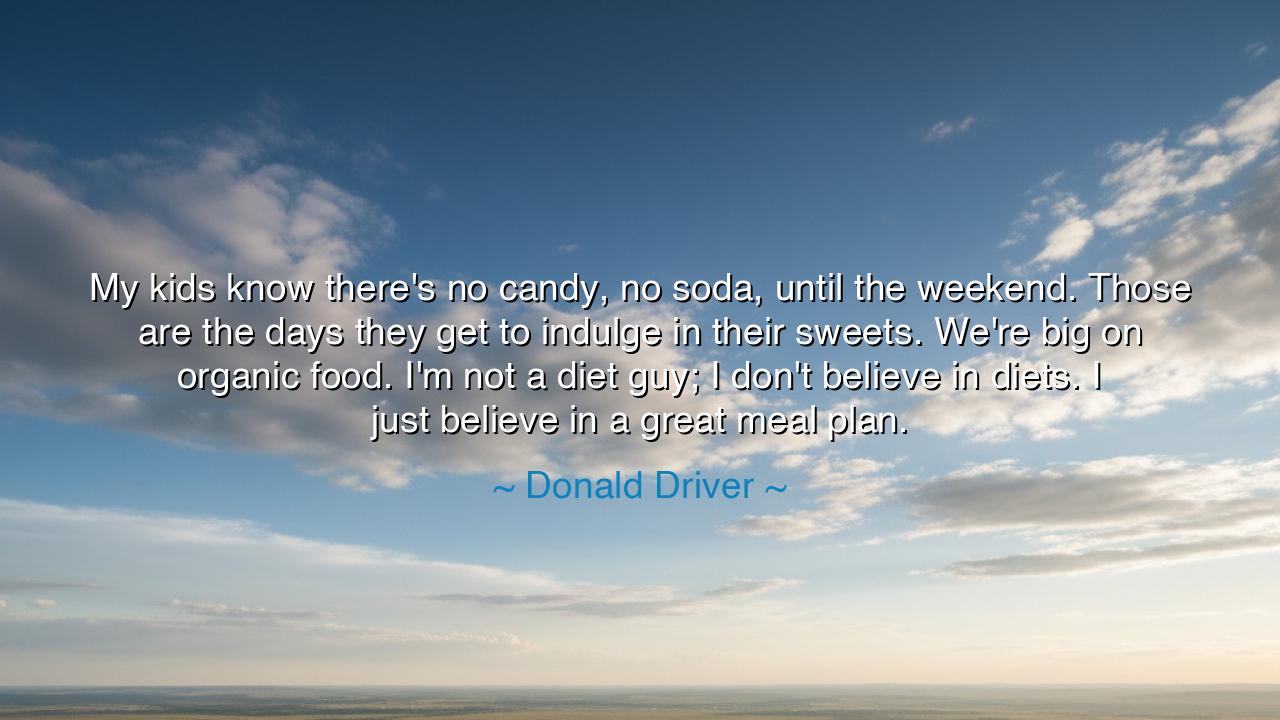
My kids know there's no candy, no soda, until the weekend. Those
My kids know there's no candy, no soda, until the weekend. Those are the days they get to indulge in their sweets. We're big on organic food. I'm not a diet guy; I don't believe in diets. I just believe in a great meal plan.






In the wise and disciplined words of Donald Driver, we find a reflection not merely on food, but on the art of balance, discipline, and intentional living: “My kids know there's no candy, no soda, until the weekend. Those are the days they get to indulge in their sweets. We're big on organic food. I'm not a diet guy; I don't believe in diets. I just believe in a great meal plan.” At first glance, these words may seem practical, even ordinary — yet beneath them lies a truth as old as civilization itself: that strength, health, and happiness are not born from extremes, but from moderation guided by wisdom. In this simple rhythm of nourishment and restraint, Driver speaks the same language once taught by the philosophers of old, who knew that self-control is not denial, but mastery.
The origin of this quote rests in Donald Driver’s life as both athlete and father — one who has lived through hardship, discipline, and triumph. From his early days of struggle to his rise as a celebrated football player, he learned that greatness is sustained not by bursts of effort, but by structure and consistency. His approach to food mirrors his approach to life: planned, balanced, intentional. When he says he does not believe in “diets,” he rejects the fleeting and the reactionary; he believes instead in a life guided by habit, by steady devotion to health and wholeness. His words, therefore, are not about food alone — they are about the cultivation of character.
The ancients spoke much of this. Aristotle, in his Nicomachean Ethics, declared that virtue lies in the mean — not in indulgence, nor in deprivation, but in balance. “To eat too much,” he said, “is gluttony; to eat too little, asceticism; but to eat rightly is wisdom.” So too does Driver echo this ancient truth. The weekend treat, the measured sweetness, becomes a symbol of harmony — the human need for joy, but within the framework of order. It is not the candy or soda that corrupts the spirit, but the lack of boundaries. By teaching his children moderation, Driver does what the philosophers counseled long ago: he teaches them freedom through discipline.
There is a story from the life of Spartan warriors, those paragons of endurance and control. Though they lived lives of strict training, even they allowed festivals and feasts — moments of joy and indulgence that gave meaning to their restraint. They knew that the human spirit, like the body, must breathe; that denial without joy turns bitter, and pleasure without restraint turns hollow. Driver’s philosophy is the same. By keeping sweets for the weekend, he gives them weight, purpose, and appreciation. The sweetness becomes not habit, but celebration — a reminder that pleasure, when earned, is richer than pleasure without cost.
When Driver says he believes not in diets but in a “great meal plan,” he speaks against the culture of extremes that pervades modern life. Diets come and go; they promise quick results but lack roots. A meal plan, however, is an expression of order and foresight — a covenant with the self. It demands thought, patience, and respect for the body’s natural rhythm. In this, we hear the same wisdom that guided the healers of the past. The physician Hippocrates taught that food should be medicine, and that health is not an accident but a way of living. Driver’s “meal plan” is that same medicine — a way to build not only strength in the flesh, but clarity in the mind and peace in the heart.
His teaching also reveals a deeper truth about legacy. When he says “my kids know,” he is not merely describing a household rule — he is describing the passing down of values, the shaping of young souls through the quiet example of daily habit. For every parent, this is sacred work: to teach through constancy, to model self-control not as punishment but as love. The ancients called this paideia — the education of the whole person. To raise children who understand balance is to arm them against the chaos of the world. It is to give them strength not only for the body, but for the spirit.
So, my child of tomorrow, take this lesson from Donald Driver’s words: build your life upon balance. Reject the fleeting promises of shortcuts and extremes. Eat with awareness, live with rhythm, and let joy have its rightful place — not as a constant craving, but as a reward for discipline. Let your habits serve your health, and your health serve your higher purpose.
For the wisdom of the ages — from the halls of Athens to the playing fields of today — remains the same: that true strength is steady, and true joy is earned. Live not by diets that come and fade, but by principles that endure. Plan your meals, plan your days, plan your actions with care and gratitude. And when the weekend comes — when the moment of sweetness arrives — savor it fully, knowing that it tastes sweeter because it was waited for, because it was earned, because it was lived in balance.






AAdministratorAdministrator
Welcome, honored guests. Please leave a comment, we will respond soon